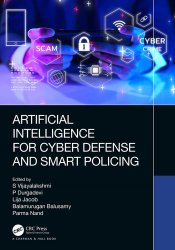 Название: Artificial Intelligence for Cyber Defense and Smart Policing
Название: Artificial Intelligence for Cyber Defense and Smart PolicingАвтор: S. Vijayalakshmi, P. Durgadevi, Lija Jacob, Balamurugan Balusamy, Parma Nand
Издательство: CRC Press
Год: 2024
Страниц: 187
Язык: английский
Формат: pdf (true)
Размер: 27.8 MB
The future policing ought to cover identification of new assaults, disclosure of new ill-disposed patterns, and forecast of any future vindictive patterns from accessible authentic information. Such keen information will bring about building clever advanced proof handling frameworks that will help cops investigate violations. Artificial Intelligence for Cyber Defense and Smart Policing will describe the best way of practicing Artificial Intelligence for cyber defense and smart policing.
Salient Features:
• Combines AI for both cyber defense and smart policing in one place.
• Covers novel strategies in future to help cybercrime examinations and police.
• Discusses different AI models to fabricate more exact techniques.
• Elaborates on problematization and international issues.
• Includes case studies and real-life examples.
Organizations share information about cyber attacks as a crucial component of cyber threat intelligence, in order to enhance their understanding of potential threats and proactively safeguard their systems and networks. Cyber-attacks and defenses both rely heavily on Machine Learning, but neither of them achieve their goals when they rely on it completely. A malware sniffer can detect malware in encrypted traffic based on an analysis of encrypted traffic elements in network telemetry. The algorithms of Machine Learning uncover threats hidden in encryption, instead of decrypting them. Since Machine Learning can recognize patterns in massive datasets and predict threats automatically, it excels in this area. By automating their threat detection, cyber teams can identify threats more quickly and can isolate situations that need to be manually investigated. The emergence of Internet of Things (IoT) applications has greatly contributed to the surge in internet usage in recent years, particularly with the widespread adoption of IoT devices.
Automated Weapons Targeting System were taken based on their accuracy and also on the ability to attach to a target immediately. Electronic focusing architectures should be improved to make them less resistant to counterattack when using this type of focusing approach. Defense measures for such methods are already commonly employed and Computer Vision is being used by automated weapon to recognize and follow goals. Whilst such frameworks are recognized as having the ability to monitor targets in regions where they can be dispatched, an automated weapon becomes basically self-sufficient. The AI driving the targeting system should be equipped to determine which target is worth focusing its capabilities on and to advise the system administrator on how to use the available information for targeting. An adversary plane travelling into contested airspace at a fast pace, a missile fired at a city, or a militarily protected personnel carrier going along a mined street could all be examples of this. Currently, there no self-governing ballistic missiles are been fired or launched without the explicit approval of a monitoring controller. One of the most important advantages of autonomous weapons is that they can choose and identify targets without the need for additional human participation. Self-sufficient armaments allow Computer Vision’s every ‘eyes’ to be fixated on the skies above, knocking back enemy missiles before they can detonate in a crowded place for preventing shock rocket attacks. If a human operator is engaged or nods off while on duty, valuable minutes may be wasted. In the cybersphere, AI can be used as a weapon.
This book is primarily aimed at graduates, researchers, and IT professionals. Business executives will also find this book helpful.
Скачать Artificial Intelligence for Cyber Defense and Smart Policing